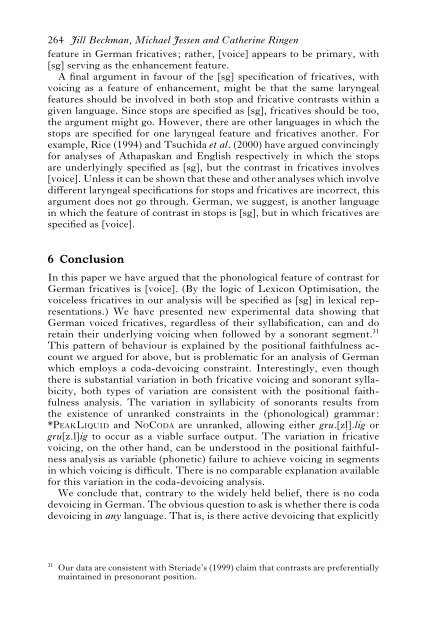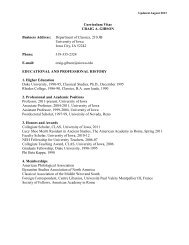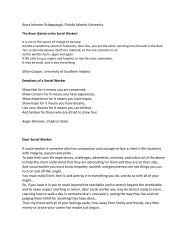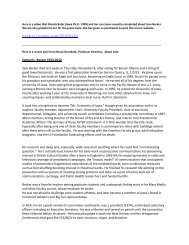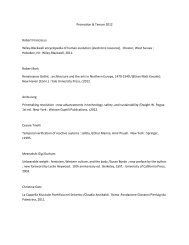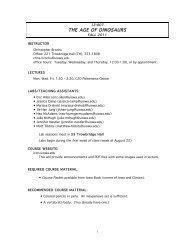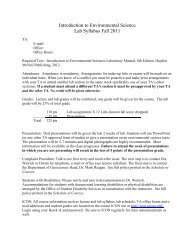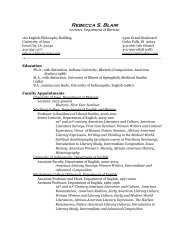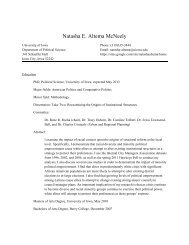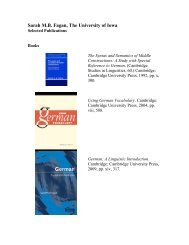German fricatives: coda devoicing or positional faithfulness?
German fricatives: coda devoicing or positional faithfulness?
German fricatives: coda devoicing or positional faithfulness?
Create successful ePaper yourself
Turn your PDF publications into a flip-book with our unique Google optimized e-Paper software.
264 Jill Beckman, Michael Jessen and Catherine Ringen<br />
feature in <strong>German</strong> <strong>fricatives</strong>; rather, [voice] appears to be primary, with<br />
[sg] serving as the enhancement feature.<br />
A final argument in favour of the [sg] specification of <strong>fricatives</strong>, with<br />
voicing as a feature of enhancement, might be that the same laryngeal<br />
features should be involved in both stop and fricative contrasts within a<br />
given language. Since stops are specified as [sg], <strong>fricatives</strong> should be too,<br />
the argument might go. However, there are other languages in which the<br />
stops are specified f<strong>or</strong> one laryngeal feature and <strong>fricatives</strong> another. F<strong>or</strong><br />
example, Rice (1994) and Tsuchida et al. (2000) have argued convincingly<br />
f<strong>or</strong> analyses of Athapaskan and English respectively in which the stops<br />
are underlyingly specified as [sg], but the contrast in <strong>fricatives</strong> involves<br />
[voice]. Unless it can be shown that these and other analyses which involve<br />
different laryngeal specifications f<strong>or</strong> stops and <strong>fricatives</strong> are inc<strong>or</strong>rect, this<br />
argument does not go through. <strong>German</strong>, we suggest, is another language<br />
in which the feature of contrast in stops is [sg], but in which <strong>fricatives</strong> are<br />
specified as [voice].<br />
6 Conclusion<br />
In this paper we have argued that the phonological feature of contrast f<strong>or</strong><br />
<strong>German</strong> <strong>fricatives</strong> is [voice]. (By the logic of Lexicon Optimisation, the<br />
voiceless <strong>fricatives</strong> in our analysis will be specified as [sg] in lexical representations.)<br />
We have presented new experimental data showing that<br />
<strong>German</strong> voiced <strong>fricatives</strong>, regardless of their syllabification, can and do<br />
retain their underlying voicing when followed by a son<strong>or</strong>ant segment.31<br />
This pattern of behaviour is explained by the <strong>positional</strong> <strong>faithfulness</strong> account<br />
we argued f<strong>or</strong> above, but is problematic f<strong>or</strong> an analysis of <strong>German</strong><br />
which employs a <strong>coda</strong>-<strong>devoicing</strong> constraint. Interestingly, even though<br />
there is substantial variation in both fricative voicing and son<strong>or</strong>ant syllabicity,<br />
both types of variation are consistent with the <strong>positional</strong> <strong>faithfulness</strong><br />
analysis. The variation in syllabicity of son<strong>or</strong>ants results from<br />
the existence of unranked constraints in the (phonological) grammar:<br />
*PEAKLIQUID and NOCODA are unranked, allowing either gru.[z&].lig <strong>or</strong><br />
gru[z.l]ig to occur as a viable surface output. The variation in fricative<br />
voicing, on the other hand, can be understood in the <strong>positional</strong> <strong>faithfulness</strong><br />
analysis as variable (phonetic) failure to achieve voicing in segments<br />
in which voicing is difficult. There is no comparable explanation available<br />
f<strong>or</strong> this variation in the <strong>coda</strong>-<strong>devoicing</strong> analysis.<br />
We conclude that, contrary to the widely held belief, there is no <strong>coda</strong><br />
<strong>devoicing</strong> in <strong>German</strong>. The obvious question to ask is whether there is <strong>coda</strong><br />
<strong>devoicing</strong> in any language. That is, is there active <strong>devoicing</strong> that explicitly<br />
31 Our data are consistent with Steriade’s (1999) claim that contrasts are preferentially<br />
maintained in preson<strong>or</strong>ant position.


